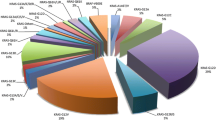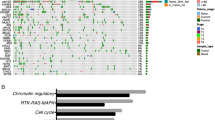Abstract
Mutations in the KRAS gene have been shown to play a key role in the pathogenesis of a variety of human tumours. However the mutational spectrum of KRAS gene differs by organ site. In this study, we have analysed the mutational spectrum of KRAS exon 1 in bladder tumours, colorectal cancer (CRC) and chronic myeloid leukemia (CML). A total of 366 patients were included in the present study (234 bladder tumours, 48 CRC and 84 CML). The KRAS mutations are absent in BCR/ABL1 positive CML. This result suggests that BCR/ABL1 fusion gene and KRAS mutations were mutually exclusive. The frequency of KRAS mutations in bladder cancer was estimated at 4.27 %. All of mutations were found in codon 12 and 90 % of them were detected in advanced bladder tumours. However the correlation between KRAS mutations and tumour stage and grade does not report a statistical significant association. The KRAS mutations occur in 35.41 % of patients with CRC. The most frequent mutations were G12C, G12D and G13D. These mutations were significantly correlated with histological differentiation of CRC (p = 0.024). Although the high frequency of KRAS in CRC in comparison to bladder cancer, these two cancers appear to have the same mutational spectrum (p > 0.05).
Similar content being viewed by others
References
Johnson L, Greenbaum D, Cichowski K et al (1997) K-ras is an essential gene in the mouse with partial functional overlap with N-ras. Genes Dev 11:2468–2481
Downward J (2003) Targeting RAS signalling pathways in cancer therapy. Nat Rev Cancer 3(1):11–22
Malumbres M, Barbacid M (2003) RAS oncogenes: the first 30 years. Nat Rev Cancer 3:459–465
Mitin N, Rossman K, Der C (2005) Signaling interplay in Ras super family function. Curr Biol 15:563–574
Prior IA, Lewis PD, Mattos C (2012) A comprehensive survey of Ras mutations in cancer. Cancer Res 72(10):2457–2467
Calistri D, Rengucci C, Seymour I et al (2005) Mutation analysis of p53, K-ras, and BRAF genes in colorectal cancer progression. J Cell Physiol 204:484–488
Saridaki Z, Georgoulias V, Souglakos J (2010) Mechanisms of resistance to anti-EGFR monoclonal antibody treatment in metastatic colorectal cancer. World J Gastroenterol 16:1177–1187
Zeegers MP, Tan FE, Dorant E, Van Den Brandt PA (2000) The impact of characteristics of cigarette smoking on urinary tract cancer risk: a meta-analysis of epidemiologic studies. Cancer 89:630–639
Cordon-Cardo C (2008) Molecular alterations associated with bladder cancer initiation and progression. Scand J Urol Nephrol Suppl 218:154–165
Castillo-Martin M, Domingo-Domenech J, Karni-Schmidt O et al (2010) Molecular pathways of urothelial development and bladder tumorigenesis. Urol Oncol 28:401–408
Czerniak B (2010) Molecular pathology and biomarkers of bladder cancer. Cancer Biomark 9:159–176
Zhang ZT, Pak J, Huang HY et al (2001) Role of Ha-ras activation in superficial papillary pathway of urothelial tumor formation. Oncogene 20:1973–1980
Jebar AH, Hurst CD, Tomlinson DC et al (2005) FGFR3 and Ras gene mutations are mutually exclusive genetic events in urothelial cell carcinoma. Oncogene 24:5218–5225
Kompier LC, Lurkin I, Van der Aa MN et al (2010) FGFR3, HRAS, KRAS, NRAS and PIK3CA mutations in bladder cancer and their potential as biomarkers for surveillance and therapy. PLoS One 5:13821
He LZ, Stephenson J, He GY, Mufti GJ (1996) RAS gene mutations in Chinese leukaemia patients and members of a family with high incidence of leukaemia. Leuk Res 11–12:901–903
Conti CJ (1992) Mutations of genes of the ras family in humanand experimental tumors. In: Klein-Szanto AJP, Anderson MW, Barrett JC, Slaga TJ (eds) Comparative Molecular Carcinogenesis. Wiley-Liss, Inc., NewYork, pp 357–378
Al-Mulla F, MacKenzie EM (2001) Differences in in vitro invasive capacity induced by differences in Ki-Ras protein mutations. J Pathol 195:549–556
Collins SJ, Howard M, Andrews DF, Agura E, Radich J (1989) Rare occurrence of N-RAS point mutations in Philadelphia chromosome positive chronic myeloid leukaemia. Blood 73:1028
Jankowska AM, Makishima H, Tiu RV et al (2011) Mutational spectrum analysis of chronic myelomonocytic leukemia includes genes associated with epigenetic regulation: UTX, EZH2, and DNMT3A. Blood 118(14):3932–3941
Agarwal A, Eide CA, Harlow A, Corbin AS et al (2008) An activating KRAS mutation in imatinib-resistant chronic myeloid leukemia. Leukemia 22(12):2269–2272
Karimianpour N, Mousavi-Shafaei P, Ziaee AA et al (2008) Mutations of RAS gene family in specimens of bladder cancer. Urol J 5(4):237–242
Nanda MS, Sameer AS, Syeed N et al (2010) Genetic aberrations of the K-ras proto-oncogene in bladder cancer in Kashmiri population. Urol J 7(3):168–173
Uchida T, Wada C, Ishida H et al (1995) Infrequent involvement of mutations on neurofibromatosis type 1, H-ras, K-ras and N-ras in urothelial tumors. Urol Int 55:63–67
Olderoy G, Daehlin L, Ogreid D (1998) Low-frequency mutation of Ha-ras and Ki-ras oncogenes in transitional cell carcinoma of the bladder. Anticancer Res 18:2675–2678
Miller MS, Miller LD (2011) RAS mutations and oncogenesis: not all RAS mutations are created equally. Front Genet 2:100
Seo KY, Jelinsky SA, Loechler EL (2000) Factors that influence the mutagenic patterns of DNA adducts from chemical carcinogens. Mutat Res 463:215–246
Barbacid M (1990) Ras oncogenes: their role in neoplasia. Eur J Clin Invest 20:225–235
Capella G, Cronauer-Mitra S, Pienado MA, Perucho M (1991) Frequency and spectrum of mutations at codons 12 and 13 of the c-K-ras gene in human tumors. Environ Health Perspect 93:125–131
De Roock W, Jonker DJ, Di Nicolantonio F et al (2010) Association of KRAS p.G13D mutation with outcome in patients with chemotherapy-refractory metastatic colorectal cancer treated with cetuximab. JAMA 304:1812–1820
Acknowledgments
We thank François Radvanyi and Aurélie Herault from the Institut Curie (UMR144 CNRS, Paris, France) andYves Allory, Karène Leroy from the Henri Mondor hospital (Créteil, France) for their help in this work.
Conflict of interest
We declare that we have no conflict of interest.
Author information
Authors and Affiliations
Corresponding author
Rights and permissions
About this article
Cite this article
Ouerhani, S., Bougatef, K., Soltani, I. et al. The prevalence and prognostic significance of KRAS mutation in bladder cancer, chronic myeloid leukemia and colorectal cancer. Mol Biol Rep 40, 4109–4114 (2013). https://doi.org/10.1007/s11033-013-2512-8
Received:
Accepted:
Published:
Issue Date:
DOI: https://doi.org/10.1007/s11033-013-2512-8




